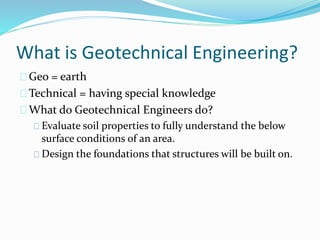Geotheta for Dummies
Wiki Article
The Single Strategy To Use For Geotheta
Table of ContentsFascination About GeothetaIndicators on Geotheta You Should KnowThe Best Strategy To Use For GeothetaA Biased View of GeothetaThe smart Trick of Geotheta That Nobody is Talking About

They carry out site examinations, accumulate examples, execute laboratory tests, and analyze information to review the viability of the ground for building tasks - Geo Tech Engineer. Based on their findings, geotechnical engineers give recommendations for structure style, incline security, maintaining frameworks, and mitigation of geotechnical dangers. They team up with various other specialists, such as architects, architectural engineers, and building teams, to ensure that geotechnical factors to consider are integrated into the general project layout and application
By evaluating the habits and residential properties of soil and rock, they can identify potential geotechnical hazards such as landslides, dirt negotiation, or slope instability. Their competence helps prevent failures or mishaps that might threaten lives and residential property. Here are some detailed obligations and responsibilities of a geotechnical engineer: Website Investigation: Geotechnical designers conduct site investigations to collect data on subsurface problems.
They analyze the data to recognize the properties and actions of the soil and rock, including their strength, leaks in the structure, compaction qualities, and groundwater problems. Geotechnical Analysis and Style: Geotechnical designers examine the information accumulated during website examinations to examine the security and viability of the website for building and construction tasks. They perform geotechnical estimations and modeling to examine aspects such as bearing capacity, negotiation, incline stability, lateral earth stress, and groundwater circulation.
Some Ideas on Geotheta You Should Know
Foundation Design: Geotechnical engineers play an essential function in designing structures that can securely support the designated framework. They evaluate the dirt conditions and lots requirements to identify the ideal foundation kind, such as shallow structures (e.g., grounds), deep structures (e.g (https://experiment.com/users/geotheta)., stacks), or specialized strategies like dirt renovation. They think about variables such as negotiation limits, birthing capacity, and soil-structure communication to develop optimum foundation layoutsThey assess building and construction strategies, monitor website tasks, and carry out area evaluations to confirm that the design suggestions are adhered to. If unanticipated geotechnical issues emerge, they evaluate the scenario and provide referrals for remediation or modifications to the design. Danger Assessment and Reduction: Geotechnical engineers analyze geotechnical dangers and risks connected with the project website, such as landslides, liquefaction, or dirt erosion.

Collaboration and Communication: Geotechnical engineers function very closely with various other specialists associated with a job, such as engineers, architectural designers, and construction teams. Reliable communication and collaboration are necessary to integrate geotechnical factors to consider right into the general task layout and construction process. Geotechnical designers supply technological competence, answer inquiries, and make certain that geotechnical requirements are met.
Rumored Buzz on Geotheta
Right here are some types of geotechnical engineers: Foundation Engineer: Foundation engineers focus on creating and analyzing structures for frameworks. They assess the soil conditions, load needs, and site attributes to establish one of the most ideal structure kind and layout, such as superficial structures, deep structures, or specialized methods like stack foundations.They examine the factors influencing slope security, such as soil homes, groundwater conditions, and slope geometry, and develop strategies to stop incline failures and reduce risks. Earthquake Designer: Quake designers specialize in evaluating and developing structures to endure seismic forces. They examine the seismic risk of a site, review soil liquefaction possibility, and develop seismic layout requirements to make sure the safety and strength of structures during quakes.
They carry out field screening, gather samples, and evaluate the accumulated data to characterize the dirt properties, geologic developments, and groundwater problems at a website. Geotechnical Instrumentation Engineer: Geotechnical instrumentation engineers concentrate on tracking and determining the behavior of dirt, rock, and frameworks. They install and preserve instrumentation systems that monitor variables such as dirt settlement, groundwater levels, incline activities, and architectural displacements to examine performance and give early cautions of prospective concerns.
Unknown Facts About Geotheta
They conduct examinations such as triaxial tests, debt consolidation examinations, direct shear tests, and leaks in the structure examinations to gather information for geotechnical evaluation and design. Geosynthetics Engineer: Geosynthetics engineers concentrate on the design and application of geosynthetic materials, such as geotextiles, geogrids, and geomembranes. They utilize these products to enhance soil stability, strengthen inclines, give drainage services, and control erosion.They have a tendency to be investigative individuals, which implies they're intellectual, reflective, and inquisitive. They are curious, methodical, logical, analytical, and logical. Some of them are also social, implying they're kind, generous, participating, person, caring, handy, empathetic, tactful, and pleasant - Geotechnical Engineers.
In the workplace setting, geotechnical engineers make use of specialized software tools to carry out calculations, develop layouts, and evaluate data. They prepare records, evaluation project requirements, interact with clients and staff member, and coordinate job activities. The workplace setup supplies a favorable environment for study, analysis, and collaboration with various other experts associated with the job.
A Biased View of Geotheta
They often see project sites to conduct website examinations, assess geotechnical problems, and collect data for evaluation. These gos to entail traveling to different places, occasionally in remote or challenging terrains. Geotechnical designers might carry out dirt tasting, conduct examinations, and display construction activities to guarantee that the geotechnical facets of the project are being applied correctly.Geotechnical designers also function in specialized geotechnical research laboratories. In these facilities, they carry out experiments, execute this link tests on dirt and rock examples, and assess the engineering residential properties of the materials. Geotechnical lab designers work thoroughly in these environments, managing screening equipment, operating tools, and taping data. They work together with various other research laboratory team to ensure precise and trusted testing results.
Report this wiki page